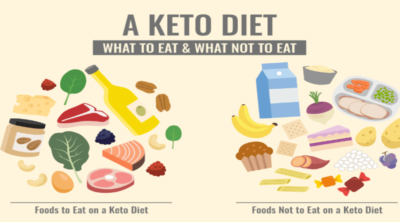
Ketogenic diet helps in weight reduction and is often used to treat epilepsy. It should not be started without consulting a medical specialist because it can result in serious adverse effects. Continue reading to know about the various undesired effects associated with this diet.
Ketogenic diet is recommended to treat epileptic seizures that are not controlled easily. Usually children with myoclonic epilepsy, tonic-clonic epilepsy, and atonic epilepsy are given this kind of diet. Scientific studies following children on ketogenic diet for a long duration derive the conclusion that, ⅓ of the study population shows 90% epilepsy control with half of the population getting complete control over it. It is a diet with high fat, adequate proteins, and low carbohydrate content and is strictly followed during the designated time period. It is a bit difficult to maintain this diet for children above 5 years because they don’t like to follow a strict diet regularly. Even though the diet is well-maintained, few unwanted effects are often observed in people restricted to this diet.
Short-Term Side Effects of Ketogenic Diet
Constipation
This diet has a diuretic effect on the body and can cause constipation. The body takes time to adapt to the changed diet resulting in constipation. Drinking 8-10 glasses of water or fluids can help in easy passage of stool. Psyllium seeds or wheat bran can also be used to relieve constipation, as they are low in carbohydrates but have a high fiber content.
Headache
People new to this diet usually suffer from headache in the first three days. This side effect is observed because there is a sudden decrease in caffeine intake and sugar level in the body as compared to what the body is used to. Such withdrawal headaches stop once the body gets used to this diet and starts burning the stored fat for energy.
Acidosis
When a person has acidosis, the level of acid increases in the body fluids. The restricted, low carbohydrate diet leads to the formation of ketone bodies. Ketone bodies are acids which are formed due to incomplete burning of fat. Their acidic nature causes acidosis in people following a ketogenic diet.
Elevated Cholesterol Level
This diet results in elevated blood cholesterol level (around 30%) and elevated triglycerides in the body. This rise is short-term as children with seizures are usually kept on this diet for around two years, after which the cholesterol and triglyceride levels get back to normal. Doctors regularly monitor the cholesterol and triglyceride levels in children on this diet.
Hypoglycemia
When the diet is started with an initial fasting phase, there is a decrease in the blood sugar level. This level is monitored during the initial phase so that the fall does not result in hypoglycemia.
Risks Associated with Long-Term Use of Ketogenic Diet
Growth Retardation
Children on ketogenic diet for a long time period may show retarded growth. This may be due to protein deficiency and deficiency of other essential nutrients that are not provided due to the restricted diet. To avoid this problem, doctors prescribe supplements to cater to the body’s basic needs of essential nutrients.
Bone fractures
The risk of bone fracture increases in children following this diet. It does not provide sufficient amount of amino acids, calcium, and magnesium to the body which results in decreased mineral content in the bones and decreased bone density. Supplements are given to compensate this deficiency in the body.
Kidney Stones
Kidney stones are found to occur in around 3-7% of the children on ketogenic diet. The diet increases the level of uric acid in the body, which starts crystallizing in the urine to form kidney stones if left untreated for a long period. High intake of water and other liquids prevents the formation of kidney stones in the body.
Menstrual Irregularities
Adolescent and adult females on ketogenic diet may experience irregularities in their menstrual cycle including amenorrhea.
Ketogenic diet is being used for the treatment of epilepsy for almost eighty years. It is a very strict diet and requires regular monitoring by a medical practitioner specialized in the field. It is not another home remedy to treat epileptic seizures and therefore, it is important to note that a ketogenic diet has to be taken up only if a doctor recommends it. It is a serious therapy that is associated with adverse effects. It is always better to inform the doctor about the observed side effects so that necessary treatment can be provided to avoid complications in the future.


